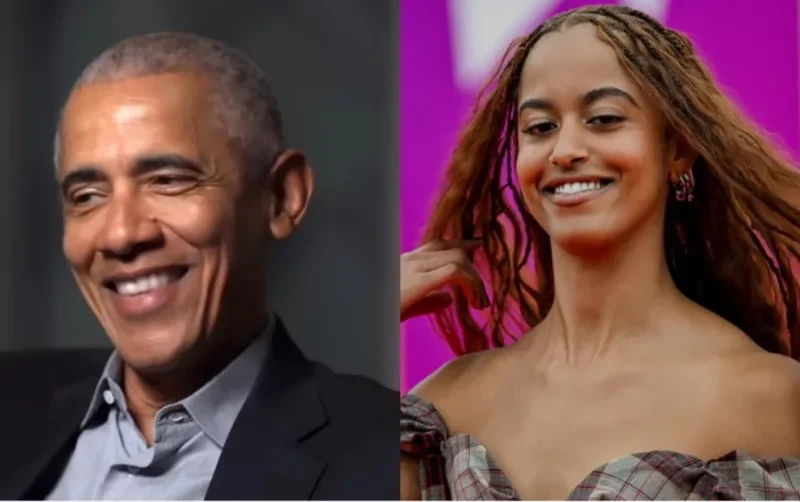Introduction to Malia Obama’s Name Change
Malia Obama, the eldest daughter of former President Barack Obama and Michelle Obama, has recently made the significant decision to drop her last name professionally. This move comes as she embarks on her career path in the entertainment industry, where she has been gaining attention for her work as a writer and producer. The choice to distance herself from her famous surname highlights Malia’s desire to carve her own identity and narrative, independent of her father’s storied legacy.
The implications of such a name change are multifaceted, as they resonate not only on a personal level but also within the context of public perception. Malia’s decision reflects a broader conversation about name identity in professional settings, especially for individuals emerging from prominent families. The professional landscape, particularly in creative sectors, often emphasizes individuality and unique contributions over familial associations, making Malia’s choice particularly poignant.
Initial reactions from both the media and the public have varied, with many expressing admiration for her decision to step into her own light. Commentators have noted that adopting a different name in her professional endeavors can allow her to be viewed less through the lens of her father’s political stature, thus providing her with the freedom to pursue her artistic goals unhampered by expectations associated with the Obama name. However, others speculate on how this decision may shape her public persona and whether it could lead to questions about her commitment to her family’s legacy.
As Malia navigates this transition, her name change serves as a powerful statement about self-definition in an era where personal branding plays a crucial role in career development. It remains to be seen how her choices will impact her future, but they certainly mark a notable chapter in her journey as an emerging professional in the spotlight.
Barack Obama’s Perspective on Malia’s Decision
In light of recent events regarding his daughter Malia’s decision to drop her last name professionally, President Barack Obama has expressed thoughtful reflections on the matter. As a prominent figure who has navigated the complexities of public life, he appreciates the importance of personal identity and individual empowerment. Obama recognizes that Malia’s choice is not just a matter of name preference but a significant act of autonomy as she transitions into adulthood. This decision emphasizes her desire to carve out her own identity separate from her renowned family legacy.
During a recent interview, Obama stated, “Every parent wants their child to find their own path, and I support Malia in her pursuit of authenticity.” This quote encapsulates his approach as a father who encourages Malia to embrace her individuality and pursue her passions freely. The former President understands that as children grow, they seek to establish their own identities, often leading them to make decisions that may differ from familial expectations.
Barack’s reaction reflects a profound understanding of Malia’s decision amidst the backdrop of a public life that often scrutinizes every action taken by the members of the family. He emphasizes that this journey is integral to her self-discovery and personal growth. In a world where names can carry significant weight, Malia’s choice highlights her confidence and desire to be recognized for her own talents and achievements. By publicly supporting her decision, Obama illustrates his commitment to fostering a nurturing environment where Malia feels empowered to navigate her path, with or without the familial surname. Ultimately, this moment serves as a reminder of the critical balance between public expectations and individual aspirations within a prominent family structure.
Cultural Implications of Name Changes in Professional Settings
The decision to alter one’s name, particularly in a professional context, can carry a myriad of cultural implications. For public figures and their families, such changes often resonate beyond the individual, reflecting societal trends and expectations. Historically, women have been pressured to adopt their husband’s surname post-marriage, which reinforces traditional gender roles. However, many women, including those in prominent positions, have chosen to retain their birth names or adapt their names to reflect personal or professional identities. This trend raises discussions about autonomy, identity, and branding in the workplace.
Malia Obama’s choice to omit her last name professionally underscores a significant shift in how personal branding is approached. In contemporary society, a name is sometimes viewed not just as an identifier but also as a complex interplay of personal history, societal perception, and individual branding. By dropping her last name, Malia may be prioritizing her individual identity over familial ties, signaling a broader movement towards personal agency among women in professional spheres.
Furthermore, societal perceptions tied to name changes are often influenced by cultural norms and gender dynamics. For instance, an individual who chooses to keep a surname may be perceived as more traditional or tied to family legacy, while someone who opts for a name change might be viewed as progressive or modern. Such judgments can vary widely across different contexts and communities. In the case of Malia Obama, her decision can also be seen as reflective of the changing landscapes of gender identity and professional branding; it evokes discussions on how women navigate their identities within often patriarchal professional environments.
As societal views on names and identities continue to evolve, Malia’s decision could serve as a touchstone for ongoing conversations about gender, professionalism, and self-expression.
Public Reaction and Social Media Buzz
The decision of Malia Obama to drop her last name professionally has sparked a significant amount of discussion across social media platforms and in public forums. This shift has captured the attention of both admirers and critics, illustrating the complex layers of identity and individual choice that are particularly prominent in celebrity culture today. Support for Malia’s choice has poured in from various communities, with many praising her for asserting her independence and distancing herself from the political legacy of her family. Advocates of self-identification and personal branding have highlighted how shedding a familial name can empower individuals, especially within the younger demographic that often champions authenticity.
Conversely, critiques have emerged, questioning the motivations behind her decision and arguing that she is forsaking a significant part of her identity. Detractors have used social media to voice concerns about the implications of such a decision on public perception and discuss the pressures faced by individuals, particularly those in the social spotlight. Such debates have highlighted the various generational differences in attitudes towards name changes and identity expressions. While older generations may value the continuity tied to family names, younger individuals seem to advocate for a more fluid understanding of identity that resonates with notions of personal autonomy and self-creation.
Overall, the sentiment surrounding Malia Obama’s choice appears to be one of supportive curiosity, alongside a dialogue revolving around personal identity versus familial ties. The cultural impact of this decision serves as a lens through which broader societal discussions can take place, shedding light on how celebrity culture influences deep-rooted perceptions of identity in modern society. As discussions continue to unfold online, it remains to be seen how Malia’s decision will affect both her personal brand and public identity in the long run.




